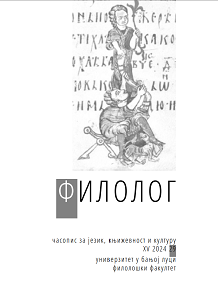ИЗНЕВЕРЕНА ПАРАБОЛА КАО КОНСТИТУТИВНА ФИГУРА У КАФКИНОМ РОМАНУ ПРОЦЕС
THE BETRAYED PARABLE AS A CONSTITUTIVE FIGURE IN KAFKA'S NOVEL THE PROCESS
Author(s): Nikola MilovićSubject(s): Czech Literature, Theory of Literature, Sociology of Literature
Published by: Филолошки факултет Универзитета у Бањој Луци
Keywords: Kafka; betrayed parable; desubstantialisation; capitalism; religion;
Summary/Abstract: This paper deals with the analysis of Kafka's novel The Process by using an Old Testament figure parable as a key for interpretation. The hypothesis is that Kafka's novel is formed like parabolical religious-sacred texts, but with a betraying parabolical final sense. Fundamental elements of the parable ‒ metaphysical sense and human freedom ‒ have been dislodged from their usual positions. We will try to show how the change in the parable happens because of the new experience of the religious, primarily through the capitalist appropriation of sacred prerogatives. Using the lines of Walter Benjamin from his text Capitalism as Religion, we will try to show the capitalistic source of Josef 's guilt. The world of The Process is distinguished primarily by the omnipresence of the judge, which aims to imitate the omnipresence of God, therefore imitating sacred grounding. Also, the main characteristic of the character is desubstantialisation, i.e., emptying of spiritual content. Such individuals are not able to store the parabolic meaning in themselves, and at the same time, they are not able to establish real interpersonal relationships. In the world constructed by a betrayed parable, there is no possibility of a happy resolution: neither such a parable can guarantee meaning nor can the desubstantialised individual rebel. The only way left is to die indifferently.
Journal: Филолог – часопис за језик, књижевност и културу
- Issue Year: 15/2024
- Issue No: 29
- Page Range: 408-428
- Page Count: 21
- Language: Serbian

